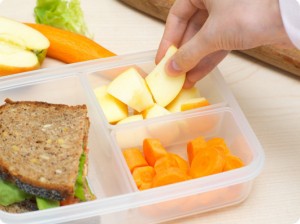 It’s been estimated that a school-aged child using a disposable lunch generates 67 lbs of [packaging] waste per school year (http://www.wastefreelunches.org). All those “single serving” packaged foods really add up! What’s convenient for parents rushing to pack lunches is causing a big inconvenience to the environment. And so the idea of “Litterless Lunches” aka “Waste-Free Lunches” was born.
It’s been estimated that a school-aged child using a disposable lunch generates 67 lbs of [packaging] waste per school year (http://www.wastefreelunches.org). All those “single serving” packaged foods really add up! What’s convenient for parents rushing to pack lunches is causing a big inconvenience to the environment. And so the idea of “Litterless Lunches” aka “Waste-Free Lunches” was born.
Eco Olympics
To increase their Waste Minimization scores, many EcoSchools have instituted “Litterless Lunches”. EcoSchools are the most environmentally conscious schools in Ontario. EcoSchools certification (http://ontarioecoschools.org) is renewed annually and several areas of ‘being green’ are measured. The better the school’s score, the further along they are on the Bronze to Gold hierarchy. Think of it as the Olympics of environmentally concerned schools/students.
Waste Minimization is one of the areas measured. The great thing about this is that it’s something very tangible, ie., it’s easy to see and measure ‘Waste Minimization’ via how much garbage is produced in the school. The intent is to have the students make less waste by using reusable containers. But, there’s “intent” and then there’s “reality.”
On the days that I’m in a school presenting to multiple classes, I invariably see students eating their lunches. When I’m at schools that have the Litterless Lunch policy I am surprised by what I see; so many items that are not reusable or recyclable. Let’s take a moment to recap basic recycling rules.
Recycling 101
These items are NOT recyclable in municipal recycling programs:
- Plastic wrap (also known as food wrap, Saran wrap, Cling wrap, etc.)
- Clear plastic bags, such as sandwich bags, Ziploc bags, or produce bags.
- Plastic food packaging, such as the wrappers from candies, chip bags, cheese & crackers snack packs, granola bars, Fruit-Roll-Ups, etc.
- Other small pieces of plastic like straws, plastic cutlery, etc.
- Aluminum foil (only the thicker aluminum is recyclable, typically used as takeout containers or disposable bake ware). Please don’t buy aluminum foil. It’s so bad for the environment. It involves mining and so much energy to make it, and then it’s not even recyclable).
- Anything that is labeled “bio-degradable” should never ever be mixed with any recyclables.
A good general ‘rule of thumb’ when considering whether a plastic item is recyclable is that if it’s small or flimsy, it’s NOT recyclable. If it helps you to remember, think about it like this: small items easily get stuck in machinery at the recycling plant, and small items are harder to collect and sort by machinery that uses sorting mechanisms. Can you imagine all the straws and bags that would be flying around?
The 3 R’s
Now that you’ve gotten refreshed on the recycling rules, I’d like to remind you that Recycling is the third “R” when we’re talking about the “3 R’s”:
# 1 is Reduce
#2 is Reuse
#3 is Recycle
Reduce and Reuse are by far the two most important “R’s”. By Reducing and Reusing, we not only make less garbage, but we also participate in using less energy. Think about all the energy used to make something and then it can’t even be recycled. Nope, that’s not good for the planet.
Be a Littlerless Lunch Hero
Take the ‘waste-free’ intent of Litterless Lunches as far as you possibly can. Think about all the R’s, not just the last one. Here are some great tips on how to be a ‘Litterless Lunch Hero’.
As an enviro-health Speaker, I present on topics related to the environment and health. I present primarily in schools, because habits and attitudes form at a young age, and I’d like everyone to have really great attitudes and habits concerning their own health and the planet’s.

Leave a Reply